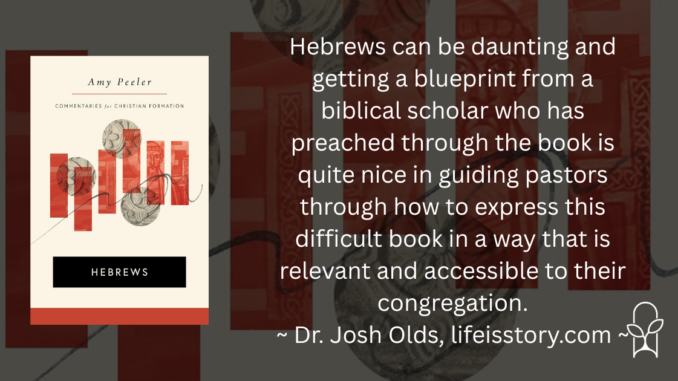
Also by this author: Women and the Gender of God
Series: Commentaries for Christian Formation
Published by Eerdmans on May 21, 2024
Genres: Academic
Buy on Amazon
Goodreads

How can the Letter to the Hebrews help Christians grow in their faith?
The Letter to the Hebrews tells us that God is trustworthy—that we can trust in Jesus’s defeat of death to lead us to eternal life. Complicating this crucial message, the letter’s enigmatic origins, dense intertextuality, and complex theological import can present challenges to believers wrestling with the text today.
Amy Peeler opens up Hebrews for Christians seeking to understand God in this learned and pastoral volume of Commentaries for Christian Formation. Her fresh translation and detailed commentary offer insights into Christology, the relationship between Judaism and Christianity, and the letter’s canonical resonances. She pays special attention to how the text approaches redemption, providing consolation for the anxious and correction for the presumptuous.
Peeler explains the letter’s original context while remaining focused on its relevance to Christian communities today. Pastors and lay readers alike will learn how Hebrews helps them know, trust, and love God more deeply.
The Commentaries for Christian Formation is a relatively new Bible commentary series from Eerdmans that has the central focus of faith formation. That is, the focus is not simply academic translation and interpretation from a literary perspective, but how through the translation and interpretation we get to a practical application. This makes the series widely appealing to pastors and church leaders not just to Christian academia. Amy Peeler’s Hebrews is the third volume in the series, following NT Wright’s Galatians and John Goldingay’s Proverbs.
Dr. Amy Peeler is professor of New Testament and the chair of Biblical Studies at Wheaton College. She received her bachelor’s degree in Biblical Languages from Oklahoma Baptist University and MDiv and PhD degrees from Princeton. It was during that time at Princeton that Peeler began to focus specifically on Hebrews as an academic area of interest, eventually writing her PhD dissertation on the use of familial language in the book of Hebrews (published as the book You Are My Son). She’s also co-written an introduction to Hebrews with Patrick Gray. However, what I knew her from was her book Women and the Gender of God, a wonderful exploration on the use of gendered language in the Bible and what problems arise from perceiving God as male. I say all of this just to make it abundantly clear that Dr. Peeler is abundantly qualified to speak on the book of Hebrews and does so in a thorough and compelling fashion.
Hebrews opens up with a 33-page introduction covering the book’s theology, place in the canon, and setting. Specific to this series, Peeler talks about the role of Hebrews in faith formation, honing in on the call to endure in faith and focusing on the so-called “warning passages” in the book. While not an important point, I was curious to know if Peeler—given her role as a female biblical scholar and academic focus on gender equality and flourishing in the faith—would take the minority position that the author of Hebrews was Priscilla. Peeler does spend a few paragraphs on this speculation, but ultimately determines that some of the arguments used to favor Priscilla’s authorship relies on gender stereotypes (namely emotion and focus on familial language) that may not be accurate. However, she notes, “If, in the kingdom of God, Priscilla herself corrects me, I will with great delight admit my error in judgment.”
The commentary proper covers the next four hundred pages. Peeler writes in a personal, reflective tone that doesn’t feel at all stuffy or academic. Yet, Hebrews retains depth and substantiveness. She mostly avoids lengthy or excessive footnoting and even when doing linguistic/translational work, keeps the text to English or an English transliteration of the Greek. It’s layperson accessible without being elementary. As the focus in on contemporary faith formation, Peeler doesn’t spend much time outlining all possible interpretive options of every passage but rather focuses on the option she feels is strongest and builds the application from that. Her exploration of the “warning passages” in Hebrews that have befuddled scholars for centuries is fresh, engaging, and thoughtful.
The book ends with ten conclusions. These are quick 1-2 page summaries of the key themes of the commentary, helping readers reflect quickly on what has probably taken them (if they are like me) quite a while to wade through. In particular, I found her section on how to preach/teach through Hebrews to be very helpful. Hebrews can be daunting and getting a blueprint from a biblical scholar who has preached through the book is quite nice in guiding pastors through how to express this difficult book in a way that is relevant and accessible to their congregation.
Overall, I am very excited about the Commentaries for Christian Formation. Eerdmans has a beautiful and diverse lineup of scholars from a variety of backgrounds. This series fills the niche between lay-level commentary and academic discussion and manages to be deep and substantive while remaining applicable and accessible.
